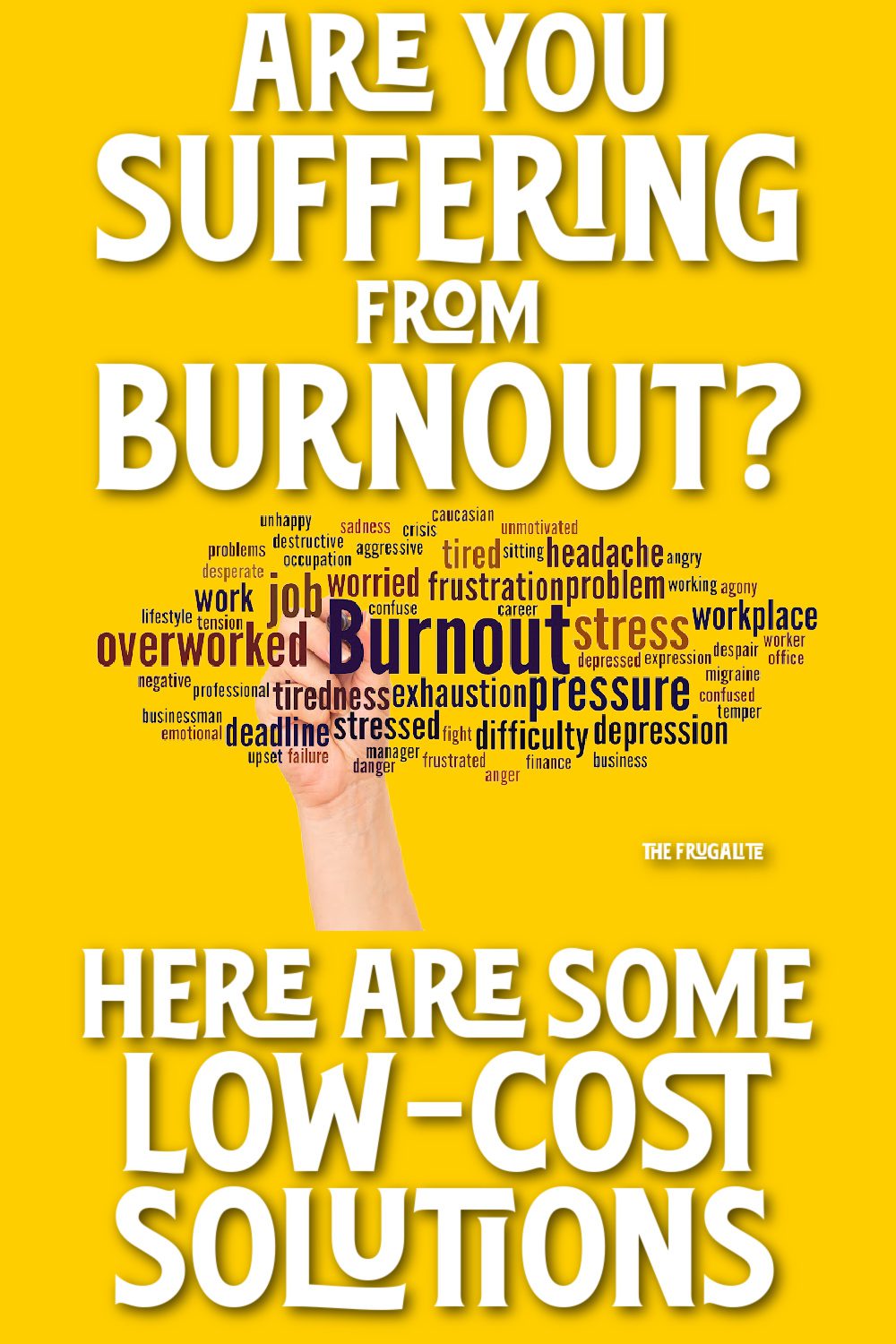(Psst: The FTC wants me to remind you that this website contains affiliate links. That means if you make a purchase from a link you click on, I might receive a small commission. This does not increase the price you’ll pay for that item nor does it decrease the awesomeness of the item. ~ Daisy)
Disclaimer: The information in this article is for information purposes only and is not intended to diagnose or treat any illness. If you feel you are experiencing burnout or at risk for burnout, it is important that you see your health professional for medical advice.
Let’s face it, life is stressful these days, particularly the past couple of years since the beginning of the pandemic. In order to maintain good health and be prepared for anything that may come in the future, it is important to be aware of burnout. In this article, I will share some low-cost and hopeful strategies to address burnout.
What is burnout?
You have probably heard someone use the term “burnout.” You may have even felt at one time like you have burned yourself out.
The term “burnout” was coined by an American psychologist in the 1970s who observed health professionals who became “exhausted, listless, and unable to cope.”
One definition I find helpful is that “Burnout is a state of emotional, physical, and mental exhaustion caused by excessive and prolonged stress.”
While the term came from the observation of health professionals in the workplace, it can affect anyone. The stresses that contribute to it do not need to come from the workplace either. Other stresses, such as caring for an ill family member, or relationship stresses, can also be a factor.
The Mayo Clinic observes that “burnout isn’t a medical diagnosis.” Although this is the case, being aware of this widely-observed dynamic can help you maintain your own health and that of your family members.
Burnout is not stress.
As the definition above observes, burnout is a state caused by “excessive and prolonged stress.” So, being aware of how stressful our lives are and when that feels excessive is important. We can’t avoid stress. Even wonderful events or times in our lives involve stress, such as getting married or coming home with a new baby.
HelpGuide.org makes these powerful distinctions between stress and burnout:
“Stress, by and large, involves too much: too many pressures that demand too much of you physically and mentally. However, stressed people can still imagine that if they can just get everything under control, they’ll feel better.
Burnout, on the other hand, is about not enough. Being burned out means feeling empty and mentally exhausted, devoid of motivation, and beyond caring. People experiencing burnout often don’t see any hope of positive change in their situations. If excessive stress feels like you’re drowning in responsibilities, burnout is a sense of being all dried up.”
Burnout can lead to depression.
The National Library of Medicine highlights that there are some symptoms that are shared between burnout and depression: “extreme exhaustion, feeling down, and reduced performance.” For this reason, it is important to see your doctor if you are not sure if you are depressed or burned out. The authors conclude that while burnout is not the same thing as depression, someone with burnout may have an increased risk of becoming depressed.
There are some signs that may help you decide if you are experiencing burnout.
The following is a list of possible signs of burnout based on a Mayo Clinic checklist.
- Feeling disillusioned or cynical about what you do
- Not able to enjoy what you do, doubting yourself, lacking a sense of accomplishment
- Not having enough energy to be productive or focus on what you need to do
- Turning to drugs, alcohol, food, excessive tv watching, or gaming to escape
- A change in your sleep habits
- Experiencing physical complaints, like headaches, bowel problems, backaches, or other, that your doctor can’t find a reason for
If you see yourself on this list, then it is important to see your doctor so you can find out if what you are feeling is burnout or depression and to rule out any other medical condition that could be causing your symptoms.
How can you address burnout?
Once you have support from your health professional, there are many low-cost things that you can do to improve your health and the quality of your life.
HelpGuide.org recommends the “Three R” approach:
Recognize – Awareness is the first step to making any change. While it may seem like a small thing, paying attention to your health and how you are managing stress can help you stay on top of conditions like burnout and prevent a major breakdown.
What do you need to do to be aware? Jot some notes in a notebook? Record some thoughts on your smartphone? Track some numbers, like hours of sleep or drinks per week, on a spreadsheet?
Find something that works for you. It doesn’t have to take much time at all, and it doesn’t need to cost a cent.
Reverse – The hopeful part of all of this is that you can recover and reverse the damage that all that stress has done to you. This is where some advice from your health professional can get you started. It is likely that you are going to need some support to make a plan here.
If you have been coping with drinking, for example, you may need some help to make a plan for how to reduce your drinking and substitute some activities that will help you build your health back. If you’ve been streaming a lot of movies and then dropping into bed, perhaps you can recall a book or two that inspires you and read them instead or call a friend.
Resilience – For today and for your future, you can focus on building your resilience and your ability to manage stress effectively. The first in this may simply be to slow down and reflect on what you need right now.
Is it your job? Do you need to quit or take some time off? Is there anything in your life that you can reduce or quit? Slowing down will allow you to get some clarity on what you need.
Reaching out for support and connection is crucial. While it may feel awkward, being honest about what you are facing could be the only way you will receive the support you need right now. Spending money to go out can be fun, but if money is tight, a simple walk in a local park with a good friend and a thermos of coffee can do wonders. Perhaps you’ve felt too tired to attend church. This might be a time when you try to reconnect with your church community or a club that you have enjoyed.
There are also some general health supports that also support recovery from burnout.
Along with focusing on your resilience, you can assess where you’re at with the basics of health. How is your diet? Have you been relying on canned soups or fast food to get you through the week? Scheduling time for one hour of cooking and doing the necessary shopping can allow you to make a big pot of something that you like to eat throughout the week. Bean and lentil-based dishes with a smaller amount of meat can still be delicious and easier on the pocketbook.
Are you exercising…at all? What is one small thing you can do this week to get started? Take a brief walk? Buy a skipping rope and jump for one minute? Do ten pushups and sit-ups today? Maybe you have a gym membership, or there is a low-priced recreational club nearby. What is something easy you could do to get started?
How are you sleeping? Are you on your phone or laptop until right before you go to bed? Some easy research on sleep hygiene might do the trick. If you find you are wound up in the evenings, some low-cost “Sleepy Tea” an hour before bedtime could help.
What are you enjoying in your life these days? You might answer in your mind, “Not a lot!” During the development of burnout, it is common to drop out of activities you previously enjoyed. Is there something you liked to do, not related to work or your source of stress, that you have around the home? Maybe your guitar is sitting there, with dust on the case. Or perhaps you might enjoy some sketching or coloring in the evening?
Maybe you can call an old friend up and do something fun like go bowling or mini golfing just for a laugh. Or you have that old project car in your garage, and a good friend that you know would enjoy coming over to tinker a bit on the engine. None of these things need to cost very much at all. The secret is to mix things up and try and get that sense of enjoyment back.
(Looking for tips on productive Frugalite hobbies? Check out this great article!)
There is a definite relationship between burnout and work-life balance. This is a good time to slow down and reevaluate where your life is at….who knows…you could come out of this to reshape things even better than ever.
Burnout is not expensive to solve.
The solutions to burnout are not expensive, as they are rooted in basic health maintenance. Have you ever suffered from burnout? Could you see yourself trying any of the low-cost tips offered here? Do you have one you can share with us? Please tell us in the comments below.
About Colette
Colette is passionate about sharing her knowledge of thrifty living and self-sufficiency. She has developed her skills in self-reliance living in the suburbs, the city, and more recently, on her own Half-Acre Homestead. Colette lived five years completely off-grid and without running water in an eight by 24 foot tiny home while designing and building her own 18 by 24-foot eco-cabin. She has just launched her website, Half Acre Homestead. Colette invites you to stop by and visit this work in progress! Coming soon in 2022 is her exciting new online program. Interested in Resiliency, Preventative Health, and Self-Sufficient/Off-Grid Housing (to name a few!)? Stay tuned for more details!












11 thoughts on “Are You Suffering from Burnout? Here Are Some Low-Cost Solutions”
As the US went from a manufacturing based economy to a “services” based economy, I think burnout escalated. Running to/from two or three part-time jobs isn’t sustainable. Too many have turned to energy drinks and now find that drinking them no longer “works” (it never really worked, was just a temporary spike due to caffeine and/or sugar). Those with a single, full-time job (regardless of said job being enough to pay the bills) have taken on additional work due to keeping head count down. IF you’re lucky, you got a bump in salary but sadly are not. The era of “you’re lucky to have a job” is here again.
Paid time off (PTO) does not exist for the aforementioned multiple part time jobs. For those who are fortunate to have PTO, you may or may not be able to take it when you need it. And sad to say that even a single day off can result in even more work/stress.
Hi Selena, You are quite right to point out how the current context of employment is now a significant contributor to burnout. It is much the same here in Canada. Youth are feeling hopeless, working numerous McJobs, and feel that the dream of a stable job and home ownership is now beyond their grasp. These are stressful times!
However, I am continually amazed how, even on difficult days when I am truly exhausted, I can find beauty in nature and/or my connections with friends and family. Like many, I have no paid time off, no benefits, but I find that investing in my resilience and basic health is helping me get through these troubling times. Sometimes one day at a time, and sometimes just one hour at a time!
Notice that our media and government are doing everything they can to increase your burnout. All you hear is “Abandon all hope” messages from them.
Hi Bill, Yes! You are spot on! All the more reason why we need to strategize about how to build our own resilience, that of our immediate circle and that of our local community. For my own health, I am very selective about what media I consume. I focus my energies on supporting our local community in terms of issues like food security and affordable housing. I nurture my connections with like-minded people, which are so precious to me and feed my soul. I find I enjoy my life more when I focus on how I am BE-ing, instead of focussing only on what I am DO-ing all of the time. Wishing you the best this fall!
I like this. I especially like the way you keep the suggestions simple and approachable, because a person suffering from burnout is probably not want to add much to their already heavy load.
I have a few I’d like to add – if a person is suffering burnout, and know what their stressors are, they could do something small to address those specifically. For example, if a problem is boredom and they still commute, how about listing to a really interesting book during the commute? Something that keeps the reader coming back for more, or is really funny?
Or, if the news is driving a person crazy but they can’t avoid it, how about taking a day or two every week as a “news vacation?” That way a person can still keep up with current events but at the same time, give themselves permission to take a break.
Another thing that can SOMETIMES help is to take a moment or two and think about the impact the dolorous job actually has. For example, I used to work the phones at a mail order pharmacy. It was a pretty cruddy job to be perfectly honest and I was quite tired of it. Sometimes I got a little relief when I reminded myself that this was a way to make a positive difference. I might be the only friendly person my customers would talk to that day, and at times I could tell they weren’t used to being treated with respect. It made my day a little better to think about being able to spread kindness.
Lastly, if a person is truly miserable, working on an exit strategy can help. Working on a new skill for even a few minutes a day, expanding a side hustle so you need the job less, or exploring other career options can help a person feel less trapped. After all, feeling trapped is a sure path to burnout.
Thank you for the article!
Hi Redbranch, I hope that everyone who read the article also reads your thoughtful comment. HEY!! ALL!! READ THE COMMENT ABOVE HERE!!!!
I am grateful that you took the time to add some useful and compassionate suggestions for readers. Each of your ideas addresses a significant concern about burnout, and offers a do-able strategy to try and make it better through a small step. Much appreciated. Wishing you the best this fall!
Thank you, Colette, for putting a name to the dis-ease of constant pressure. That alone helps, to recognize this continuous slow burn is not healthy and take steps to alleviate it.
Hi The Library Ann, I am so glad to hear your response to this article. It was exactly what I had hoped folks would take away from it. It’s not our fault…we’re the frogs in the pot….we need to unplug and get out of the water before it boils. Wishing you the best!!!
Burning out versus bugging out
Sometimes the causes of burnout are not locally fixable and the only remedy becomes an INCH-type version of bugging out (INCH meaning “I’m never coming home”). After Lincoln’s 1860s un-Civil War tax war against the South many ex-confederates were so badly treated that they literally left this country. Some headed to Cuba, some to Mexico, and some to Brazil where they founded a new town they named Americanos. Some died at sea in ship wrecks. As one example of oppression … when parts of Kansas were opened up for homesteading in the 1870s (per Lincoln’s 1862 homestead act) ex-Union soldiers were allowed to file claims for free new land but ex-Confederates were not. One historical note: when some ex-confederates made the trip on foot to return to their Southern homes after the war they were often known as the “homeward bound” people — which was frequently shortened to HOBO — even though that term has mostly lost its original meaning today.
Years ago when I researched my genealogy I learned of multiple international bug-outs in the history of several of my ancestors. One Polish ancestor escaped his POW status in the Gulf of Riga near Latvia during Sweden’s Great Northern War circa 1700 and made his way to New Jersey by 1704. One ancestral couple fled Ireland about the time of the so-called Potato Famine during which the British military blockaded all relief food supplies so millions would starve. Another ancestor’s people had been living in Ukraine for about four generations after Russia’s Catherine the Great offered them free land (bought from the Ottoman Empire) to farm and exemption from the Russian army draft (slavery).Then a new Czar decided that ancient exemption from the Russian draft had suddenly expired. So those of my ancestors who could afford to bug out … bought passenger tickets to New York and then a train ride to the Midwest — within that same year. The ones who remained behind (and their children) were mostly starved to death later in Stalin’s 1930s holodomor (forced starvation) when he stole all their crops and stored food supplies. I found in a microfilmed version of my old hometown newspaper where some relatives in Ukraine had stayed in touch with their expat relatives in the US midwest. They wrote a letter to the editor asking for help because they had been forced to cut up a cowhide rug into small size pieces to boil for something to eat. That was their last communication ever.
Today with so many things going badly regarding living in the US … a growing number of people are seeking expat solutions. I hear these stories from a long time friend whose fight with the IRS became intolerable — and who moved to Latin America and created a business of helping potential expats to decide whether (and where) to move. While the burnout versus bug-out terminology may not be part of their vocabulary … it would certainly be an appropriate fit.
–Lewis
Lewis,
Thank you for sharing that fascinating history! I had no idea where the term HOBO originated; it seems that folks in the post Civil War/Reconstruction era were as fascinated with acronyms as we are today. Ditto, the INCH acronym. Sad to hear about the Ukrainian relatives eating their cowhide rug, and the potato famine and holodomor sufferers, and all the rest. Guess we’ve been very lucky to be safe in the U.S. so far, but who knows what tomorrow will bring?
Hi Lewis, Thank you for another insightful post. When the burnout becomes unbearable and is connected to local dysfunction, then the bugout begins to look appealing. I myself see many of the developments in society today and shake my head. However, I wonder….”Where would I go?” I do talk to people who are moving to Latin America. As I get older, these severe winters I face are getting less and less tenable. It’s a hard choice. Like your ancestors, many of mine had to make difficult choices and uproot themselves and their families.
My heart broke to read the story about your relatives and the cow hide. How tragic! One might wonder what is coming in the next few decades.
All over the world these days, people are having to look at their local resources and political climate and make difficult choices. Thank you for reminding us all of the larger picture that connects to burnout. Much appreciated!